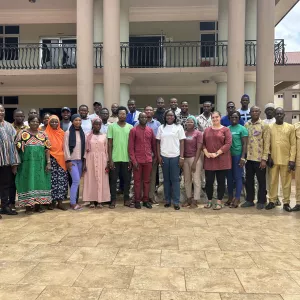Unlocking aquaculture’s potential: Northern Ghana stakeholders co-design sustainable fish farming models
Group photo of workshop participants (photo credit: IWMI). With marine fish stocks declining and rural livelihoods under strain, small reservoirs in northern Ghana are emerging as promising alternatives for aquaculture-based food and income security. On June 10, 2025, 37 stakeholders from policymakers and researchers to fish farmers and private sector actors gathered in Tamale, Ghana to co-design inclusive,

Unlocking aquaculture’s potential: Northern Ghana stakeholders co-design sustainable fish farming models

Group photo of workshop participants (photo credit: IWMI).
With marine fish stocks declining and rural livelihoods under strain, small reservoirs in northern Ghana are emerging as promising alternatives for aquaculture-based food and income security. On June 10, 2025, 37 stakeholders from policymakers and researchers to fish farmers and private sector actors gathered in Tamale, Ghana to co-design inclusive, sustainable aquaculture business models tailored for northern Ghana. The event, hosted by the International Water Management Institute (IWMI), was convened under the CGIAR Sustainable Animal and Aquatic Foods (SAAF) Science Program.
Participants included representatives from national and regional government and regulatory bodies such as the Ministry of Fisheries and Aquaculture Development, the Fisheries Commission, the Environmental Protection Agency, and the Northern Development Authority as well as research and development organizations, including IWMI and the Council for Scientific and Industrial Research – Water Research Institute (CSIR-WRI). The private sector was represented by fish feed suppliers, hatcheries, private fish farmers, and aggregators. Community-based organizations also participated, including fish farmer groups and local leaders. This diversity ensured a rich exchange of perspectives on aquaculture development, regulation, and market systems.
The workshop built on research insights from IWMI’s aquaculture pilots in the North-East Region, which explore how small reservoirs can support fish culture, improve food security and diversify livelihoods especially in climate affected rural communities.
Why this matters now
Marine fish stocks in Ghana have declined steadily due to overfishing and environmental pressures, resulting in a national fish supply deficit of over 50%. Yet small reservoirs—particularly in the northern regions—present untapped potential for aquaculture development. However, this opportunity is hindered by persistent challenges, including high input costs, limited technical expertise, and a lack of access to finance.
This workshop marked a strategic step toward unlocking the potential of small-scale aquaculture in the small reservoirs by involving frontline actors in shaping solutions. As Dr. Giulia Zane from IWMI explained, “Small reservoirs are not only an entry point for aquaculture—they’re a chance to rethink multifunctional water use in a way that benefits entire communities.”
Highlights from the Co-Design Workshop
The day began with presentations of the SAAF program and lessons from a pilot conducted under the CGIAR Initiative on Aquatic Foods. Participants then shifted their focus to exploring practical and sustainable ways of running aquaculture businesses that are well-suited to the specific economic, social, and environmental conditions of the local communities. Regarding constraints affecting their production activities, they raised issues such as difficulties accessing finance, expensive and scarce inputs such as fingerlings and feed, a lack of extension support, and various social and environmental risks such as dam breakages and conflicts among water users.

participants during the workshop (photo credit: IWMI/Giulia Zane).
Despite these challenges, participants identified promising business models such as integrated farming systems that combine fish with crops or livestock, polyculture approaches that optimize production cycles and bridge supply with local demand, and contract farming models that create a structured partnership between investors and local farmers. Public-private partnerships that equitably share risks also featured prominently, as well as e-based models that build farmer capacity along the aquaculture value chain
One participant remarked, “We need to start small, select truly motivated farmers, and ensure everyone—from fingerling suppliers to restaurant buyers—is connected.” This call to action captured the collaborative spirit in the room.
Beyond the technical insights, the workshop helped build new networks among practitioners, researchers, and service providers, laying the groundwork for ongoing collaboration, technical support, and innovation, signaling a clear momentum for transforming aquaculture into a more inclusive, viable, and scalable livelihood option in northern Ghana.
What’s Next?
Insights from the workshop are now shaping the design of a discrete choice experiment —a tool that presents people with different options to understand what features matter most to them— being developed under the SAAF program. The survey leverages behavioral models to gather broader community perspectives on fish consumption preferences and business modalities for aquaculture. Findings will inform the co-design of inclusive and viable business models. The next steps will focus on engaging potential investors and financial institutions to support the scaling and implementation of these models.

